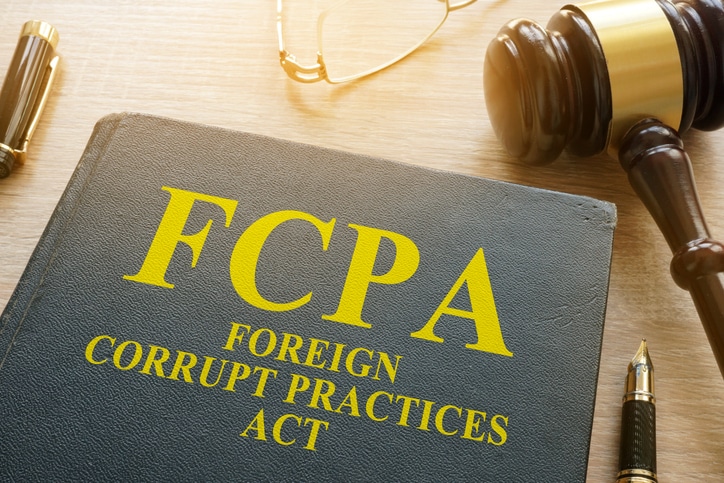May 14, 2025

This information is provided for educational purposes only by Kohn, Kohn & Colapinto and does not constitute legal advice. No attorney-client relationship is created by accessing this content. Laws and regulations may change, and this material may not reflect the most current legal developments. If you believe you have a whistleblower claim, consult a qualified attorney to discuss your specific circumstances.
Filing Anti-Money Laundering Claims: Overview
As part of the National Defense Authorization Act of 2020 (NDAA), Congress passed a major overhaul of the nation’s money laundering laws, known as the Anti-Money Laundering Act (AML Act). The AML Act includes a new AML whistleblower law, which was strengthened in late 2022 with the passage of the AML Whistleblower Improvement Act.
Under the law, qualified whistleblowers, individuals who voluntarily provide original information about money laundering violations that leads to the success of an enforcement action, are entitled to monetary awards of 10-30% of the sanctions collected in the enforcement action. Certain money laundering violations may also be covered under the SEC and IRS whistleblower programs which also offer whistleblower awards.
By working with an experienced whistleblower attorney, an individual can safely disclose money laundering violations to U.S. authorities and, if their disclosure leads to an enforcement action, receive a monetary award.
Below is our short how-to guide on filing an anti-money laundering claim.
Key Takeaways
- Under the new AML Act the Secretary of Treasury (SOT) is required to pay qualified whistleblowers 10-30% of the collected proceeds obtained by the government in a whistleblower-triggered case.
- Mandatory awards between 15-30% may also be available under the IRS whistleblower law. The IRS whistleblower law covers money laundering crimes investigated by the IRS.
- Mandatory awards between 10-30% may also be available under the Dodd-Frank Act, whenever publicly traded companies and banks are implicated in the crimes.
- Under the AML Act’s whistleblower law, claims are filed with the Secretary of Treasury (SOT). The SOT is expected to publish regulations regarding filing procedures.
- Confidential and anonymous claims can be filed under the DFA and the AML Act. Additionally, the IRS will strictly protect the confidentiality of whistleblowers.
- All of the laws that potentially cover AML violations permit non-U.S. citizens to file reward claims.
- All of the laws that potentially cover AML violations have anti-retaliation protections, but the type of protection is controlled by each specific law.
The Anti Money Laundering Claims Process
Filing a reward claim based on AML violations is extremely complex, as there are at least three reward laws that may be applicable to the claim, and each has separate filing rules.
Additionally, the Secretary of Treasury has not published rules concerning the newly enacted AML Whistleblower Law, and assistance from an attorney is essential for correctly filing cases under that law.
Finally, in order to file an anonymous claim under the Dodd-Frank Act or the AML Whistleblower Law, the rules require that the whistleblower be represented by an attorney licensed to practice law in the United States.
We advise contacting a whistleblower protection attorney if you have information about money laundering and thinking of blowing the whistle and applying for awards.
Below is a short and concise overview of the filing process:
1. File Your Anonymous Claim
File a confidential and/or anonymous claim with the appropriate law enforcement agency, pursuant to the specific rules governing these filings.
The U.S. Securities and Exchange Commission (covering publicly traded companies, including most large banks) requires the filing of a Form TCR, as does the Commodity Futures Trading Commission (CFTC).
The IRS requires the filing of Form 211. The Secretary of Treasury (“SOT”) currently does not have rules for filing under the AML Act. Until such rules are published, claims should be filed directly with the SOT.
You may also want to file your claims under the AML Act with the Financial Crimes Enforcement Network (FinCEN). However at this present time, FinCen does not have rules or procedures for accepting whistleblower claims.
2. Cooperate with Investigation
Make sure you obtain an official acknowledgment from the SEC, IRS, CFTC, FinCEN, and/or the SOT confirming receipt of your complaint or claim application. Thereafter, fully cooperate with the investigations conducted by these law enforcement agencies.
The IRS, SEC and CFTC has detailed rules governing their programs. Make sure you follow these published rules. It is anticipated that the SOT will publish procedures shortly.
3. Consider Filing “Related Action” Claims
All of the laws that cover AML include a “related action” provision. The “related action” provision permits whistleblowers to qualify for a reward even if another law enforcement or regulatory agency issues a sanction. Related action claims are often based on related criminal prosecutions conducted by the Department of Justice. Follow the rules of the SEC, IRS, CFTC, and SOT whenever filing a related action claim.
4. Apply for the Award
All of the whistleblower award laws follow a two-step process. The first is filing the initial claim or complaint with the SEC, IRS, CFTC and/or SOT. This filing should provide “original information” to the appropriate law enforcement agency, consisting of the information or evidence the whistleblower has necessary to trigger an investigation into AML violations or information that will help these agencies successfully prosecute persons or banks involved in money laundering.
The second step occurs after a wrongdoer is sanctioned. Once an individual or company is sanctioned (i.e. pleads guilty, enters into a deferred prosecution agreement, is subjected to an administrative enforcement action, etc.), a formal reward application should be filed.
All agencies have specific rules on applying for rewards, criteria for justifying an award, and specific time-requirements for filing an application. The AML Whistleblower Law sets forth criteria for determining the size of an award. The SOT is expected to adopt rules or procedures for filing award applications.
Frequently Asked Questions
Can AML whistleblowers be fired?
The AML Act includes an anti-retaliation law that prohibits employers from retaliating against employees who blow the whistle on potential money laundering violations. The law requires cases to be filed with the U.S. Department of Labor within 180-days of an adverse action. However, this law does not directly cover employees who work for FDIC insured banks or credit unions. Employees at these institutions must file in federal court under older and less effective whistleblower protection laws. These older laws are 12 U.S.C. §§ 1790b and 1790c (employees at insured credit unions) and 12 U.S.C. § 1831j (employees at FDIC insured institutions). The IRS, CFTC and SEC whistleblower laws all have modernized anti-retaliation provisions.
What anti-retaliation protections are for employees at FDIC insured institutions or federally insured credit unions?
The existing whistleblower protections laws for employees at FDIC insured institutions or credit unions, codified at 12 U.S.C. §§ 1790b and 1790c and 12 U.S.C. § 1831j, are very problematic. The laws do not contain provisions for the payment of attorney fees or costs to prevailing whistleblowers. Also, internal whistleblower disclosures are not explicitly covered under these laws.
The scope of a protected disclosure is very narrow under these laws. Under 12 U.S.C. § 1831j, employees at FDIC insured institutions must raise their concerns regarding violations of banking laws with the FDIC, the Federal Housing Finance Agency, the Federal Reserve Board, the Comptroller of Currency and/or the Attorney General.
Under 12 U.S.C. §§ 1790b and 1790c, employees at insured credit unions must raise their allegations of banking law violations with the National Credit Union Administration Board, and/or the Attorney General. Significantly, reports to either the Secretary of Treasury or to FinCEN are not covered under these older laws.
These two older laws do not have provisions permitting anonymous or confidential submissions. Congress’s failure to cover credit unions or FDIC insured financial institutions under the new (and far more effective) AML Act’s anti-retaliation law is a major problem with the AML Act.
However, because the IRS and the securities laws have much stronger anti-retaliation provisions, employees should carefully consider whether their AML allegations may be covered under either of these laws, and if so, file disclosures using the IRS and Dodd-Frank laws. In this manner employees should be able to benefit from the stronger anti-retaliation laws covered under these statutes.
Other Important Things to Remember
Money laundering often involves violations of several laws. Thus, do not only file a case under the new AML Act. Carefully consider and research whether other agencies may also have jurisdiction to investigate and sanction the banks, other financial institutions, or the individuals involved. Additionally, those who engage in money laundering often are involved with other crimes, covered by other reward laws, such as foreign bribery and tax evasion. Make sure you are covered under all applicable laws.
Our Firm’s Cases

$2 Billion Recovered
Wilkinson blew the whistle on a $230 billion Russian money-laundering scandal that moved rubles out of Russia, converted them to dollars at Danske Bank Estonia Branch, then to moved the dollars to New York. The largest money laundering scandal in history.





